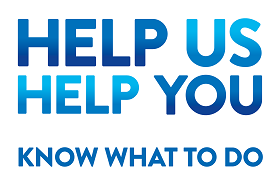Be Like Becky and Spot the Signs of Domestic Abuse
Tuesday, August 14, 2018

‘Becky’ (not her real name) is looking forward to a night out with friends this weekend. But she hasn’t always felt that way. There was a time when, if she went out at all, she would be very worried about what she chose to wear and what time she arrived home.
What ‘Becky’ didn’t realise then, was that her ex-partner’s controlling behaviour didn’t show how much he cared about her and it wasn’t just the way he was a bit jealous, she was subject to ‘coercive control’ which is a form of Domestic Abuse.
Coercive control includes behaviour like threats, humiliation and intimidation that is used to punish or frighten the victim. Actions such as controlling money, always criticising and being purposely isolated from friends and family, controlling where the person goes, what they do, or exaggerated expressions of love such as they ‘can’t live without you’.
The behaviour is being highlighted in a new Council led campaign ‘Escape the Control’ launched across Knowsley and Sefton to help people understand how this extreme control is Domestic Abuse and what signs to look out for, if concerned about friends or family.
‘Becky’ said:
“He’d tell us we couldn’t touch the food in the fridge, that we weren’t allowed to eat, he’d lock us in the house and go out or he’d unplug the phone. He used to take an element out the central heating, so we’d have no heating. He’d take the modem, so John couldn’t do his homework and I couldn’t do my banking on the computer. So, we were prisoners in a way.”
“The kids couldn’t have any friends round because he’d kick off or something. Kids’ parties were another problem because he’d be accusing me of trying to ‘get off’ with one of the dads, so parties were out the question. We couldn’t do any after school clubs because I had to be back by a certain time. Me and the kids weren’t allowed to go around to see their grandparents.”
In 2015, coercive control became a crime in England and Wales, punishable by up to 5 years in prison and/or a fine.
Dr Emma Katz, Lecturer in Childhood and Youth at Liverpool Hope University, has carried out in-depth research into the impact of coercive control. She said:
“Coercive control is at the core of a lot of cases of domestic abuse. The perpetrator uses coercive and controlling behaviours to gain all the privileges, freedoms, power and rights in the relationship, while leaving the victim with none. They want the victim’s life to become all about pleasing the perpetrator and doing what the perpetrator wants. Due to the fact that perpetrators are extremely clever at excusing, minimising, justifying and denying their behaviour, the partner or family member may have little understanding of domestic abuse and may not realise that they are experiencing it.”
Posters and leaflets explaining the signs to look out for are available in GP and Health Centres, Leisure Centres, Dentists, Hairdressers and many more everyday locations where victims and those worried about others, can access the information without having to go through official channels.
‘Escape the Control’ will also be featured across buses, taxis and fire engines across Knowsley and Sefton directing people to more information on the Escape the Control website. www.escapethecontrol.co.uk
Councillor Shelley Powell, Cabinet Member for Communities and Neighbourhoods for Knowsley Borough Council says:
“Insight from Knowsley and Sefton indicates that although anyone can experience domestic abuse irrespective of age, gender, ethnicity or sexual orientation, the majority of cases are amongst women under 35. We need to ensure that people understand that extreme controlling behaviour such as telling what you can and can’t eat, or what you can or can’t wear, is domestic abuse and where they can find more information and support.”
Domestic Abuse is an issue which affects 1 in 3 women and 1 in 6 men, accounting for 16% of all violent crime, with more repeat victims than any other crime. (British Crime Survey).
Sefton Council’s Cabinet Member for Communities and Housing, Trish Hardy, says:
“The number of people accessing domestic abuse support services continues to increase, with the number of high-risk clients being supported increasing by 63% between 2013/14 and 2014/15. Extreme controlling behaviour or coercive control often begins very slowly and can be hard to understand. We want people to be aware of the signs, both for themselves and for friends and family and to know what to do in that situation.”
Deputy Police and Crime Commissioner for Merseyside, Emily Spurrell, says:
“I welcome this new campaign to highlight the signs of controlling behaviour and how individuals can help themselves or others. Everyone has the right to live free of fear. If you are unreasonably under suspicion from your partner or a member of your family to the point where you are unable to remain in contact with your circle of friends; if you are constantly questioned about who you were talking to or who you were texting; perhaps you have no access to money, even the money you earn. This is coercive control which is domestic abuse and that is a crime. Merseyside Police take coercive control extremely seriously and would urge anyone with concerns to report it.”
Domestic abuse – including controlling behaviour like this - is a crime. But it’s effects reach far wider. As a victim or a survivor of domestic abuse, you can experience health issues, and in particular mental health problems, which can last a long time. And if you’re a child, witnessing or experiencing domestic abuse has a major impact on the safety and wellbeing of children and young people.
Helen Case, Designated Nurse for Children in Care from NHS South Sefton CCG and NHS Southport and Formby CCG comments on the impact on children:
“In the UK, one in four of young people, aged 10 to 24, reported that they experienced domestic violence and abuse during their childhood. Children may feel angry, guilty, insecure, alone, frightened, powerless or confused. They are also at increased risk of feeling anxiety, depression and post-traumatic stress disorder. At school age, they can do less well in school, find it hard to concentrate, be aggressive to other children and abuse alcohol and/or drugs. So the impacts of domestic abuse in the family are much wider for children, who are developing and learning how to live in the world.”
Matthew Ashton, Director of Public Health for Knowsley and Sefton sums it up by saying:
“Domestic abuse is more than a crime and its impact is far reaching. It can affect anyone, any age, and has lasting effects on our communities and especially our children and young people. But the scale and impact of this domestic abuse is still not known – it is a hidden issue and people want it to end. This kind of campaign works to raise awareness - in particular the little understood issue of coercive control – so that it becomes less acceptable in our communities. Living with domestic abuse and controlling behaviour is not something anyone should have to do, but we know that people can and do escape the control and return to having positive and rewarding lives, where they make their own choices again.
Becky agrees. She says “I’m away from all that now. It was hard to break free and it took a while for us to feel secure again, but now I’m not living with that control I can get on with what I want to do, for me and for my kids. I feel strong again. I would say to anyone who is in the kind of place I was – recognise the signs - don’t ignore them - and get help. There are people who can support you to get out, when you want to, when you’re ready. “
The campaign is running during July and August in Knowsley and Sefton with more information available at: www.escapethecontrol.co.uk or you can follow the campaign at: www.facebook.com/escapethecontrol, and www.twitter.com/escape_control hashtag #escapethecontrol.





